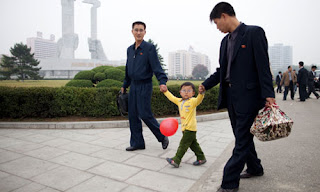 A street scene in Pyongyang. Photograph: Dan Chung/Guardian
A street scene in Pyongyang. Photograph: Dan Chung/GuardianOld men playing cards in a park; a woman shopping for vegetables; tired workers jostling for space on a rusting trolley bus. These tiny glimpses of daily life would be unremarkable anywhere else. But this is Pyongyang, capital of one of the world's most insular countries, and even the mundane is an extraordinary sight – more fascinating to a journalist than the pomp of North Korea's largest military parade, the real reason we have been allowed in.
We expect to see the portraits of Eternal President Kim Il-sung and his son, the Dear Leader Kim Jong-il, gazing down at us from roadsides. We have been well briefed on socialist haircuts and vinalon, the miracle fabric made from limestone and better known for durability than comfort. We have read the propaganda, combining revolutionary fervour, the vocabulary of 30s potboilers and accounts of Kim's visits to potato-starch factories.
But who knew that The Da Vinci Code was a hit in this strictly controlled city? That Céline Dion is a karaoke favourite? Or that the mass performances are not only a tribute to the leadership and motherland, but the way that many young people find partners?
Few foreigners see this city at all. Around 2,000 western tourists visited last year, plus perhaps 10 times as many Chinese visitors. The expatriate population, excluding Chinese and Russian diplomats, and including children, stands at 150. Mobile phones are confiscated at entry; visitors are accompanied by official escorts at all times; tourists' photos are inspected and frequently deleted, even when their subject matter is – to outside eyes – entirely innocuous.

Information is so sparse that interpreting North Korea is not so much like reading tea leaves in a saucer as examining them while they float in a milky brew. People devote their careers to the country yet acknowledge they know little about it – one Seoul-based expert, Park Hyeong-jung, is reportedly writing a paper on "just how terrible our research and predictions are", though others say information about daily life – such as market prices – is much better than two decades ago.
Our rare media trip has been organised by the government at little notice to show the world that Kim Jong-un, the leader's youngest son, is now heir apparent. We arrive in Pyongyang less than 24 hours after flinging scribbled applications at the Beijing embassy and officials admit they hadn't expected so many journalists. With minders in short supply we have more freedom than usual, visiting the railway station, department store, vegetable shops and kiosks and a local restaurant. This is by far the wealthiest section of the wealthiest part of the country.
"Nobody who lives in Pyongyang is an ordinary person. This is the top five to 10% of the population," points out Barbara Demick, whose book Nothing To Envy offers a vivid account of ordinary life in North Korea.
On top of that, we have arrived amid unusual celebrations. The party has promised special supplies to households in the capital, including a bottle of alcohol, cooking oil and sweets. Most passersby are drab, in grey, khaki or navy outfits; their only colour the red Kim Il-sung badge pinned to each lapel. But women attending the military parade have brought out their bright traditional gowns for the holiday and others show a thirst for colour, with vivid bags or jackets. Hot pink is a surprisingly popular shade in Pyongyang. Most are immaculately made-up and all are neatly coiffed. Hair is a serious matter in North Korea, which licences a limited range of haircuts – in 2005, state television launched a series titled Let's Trim our Hair in Accordance with the Socialist Lifestyle.
On the streets, a handful of residents lick ice lollies; one tiny girl holds a candy floss stick in each hand. Across from our hotel, people jostle at food stalls for savoury pancakes, fritters and pizza (reportedly a favourite of Kim Jong-il's). An enormous white frosted cake with pink icing roses is priced at 9,000 won (£6.25), while a dish of shaved ice with syrup costs just 5 won. Young men take aim at shooting stalls, and around town crowds gather to watch open-air concerts, the bands lined up in neat rows like Merseybeat-era Beatles.
But some who know the city suggest that attractions such as the street lighting will vanish once we have gone. Even during our visit, most roads away from our hotel are dark. The sleek restaurants surrounding it are almost empty. The central department store is gloomy, illuminated only by late-afternoon light and a string of fairy lights. As at a rainy English fete, the effect of the bunting above the counters is more plaintive than festive. Stock lies untroubled in glass counters or on the shelves behind them: lengths of plaid fabric, clocks, footballs, pastel towels, TVs and even a cafetiere set. There are perhaps 20 visitors sprinkled across four sizeable floors and the only actual customer appears to be a small child buying a cheap plastic toy.
Hiç yorum yok:
Yorum Gönder